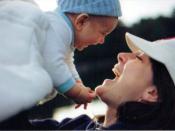Describe and critically assess research in to the effects of deprivation on the subsequent development of children.
Bowlby (1969) argued that maternal deprivation caused affectionless psychopathy: the inability to form meaningful interpersonal relationships in later life. However, the link between affectionless psychopathy and bond disruption is not wholly supported by later studies. Instead, it seems Bowlby's definition of 'deprivation' was too broader term, with his hypothesis relating to 'privation' instead. Rutter (1970) split the term 'deprivation' in to 'privation': lack of an attachment figure from the outset, and 'deprivation': loss or separation from the attachment figure with whom a bond had been created.
Bowlby drew his conclusion from several of his own studies. He looked at 44 juvenile delinquents, 14 of whom had a 'guiltless', i.e. affectionless character. 9 of these 14 had experienced separation from their primary care giver in childhood, whereas only 2 of his control group had.
However, 14 out of 44 does not seem a sufficient enough number to prove his theory, and it seems likely as Rutter suggests, the delinquents had not suffered deprivation, but privation.
Another of Bowlby's studies disproves his own theory of deprivation. He observed 60 children aged 7 to 13 who had spent 5 months to 2 years in a TB sanatorium at various ages up to 4. Half had been separated from parents by age 2. The separated children were more prone to daydreaming, were more over-excited, concentrated less and were less competitive. However, overall they were more similar to ordinary children than different, and did not show affectionless psychopathy, regardless of when the separation occurred.
Numerous studies seem to suggest that deprivation need not have long-term effects. Deprivation can occur as a result of divorce, death or illness, and the important feature is that an attachment was...


